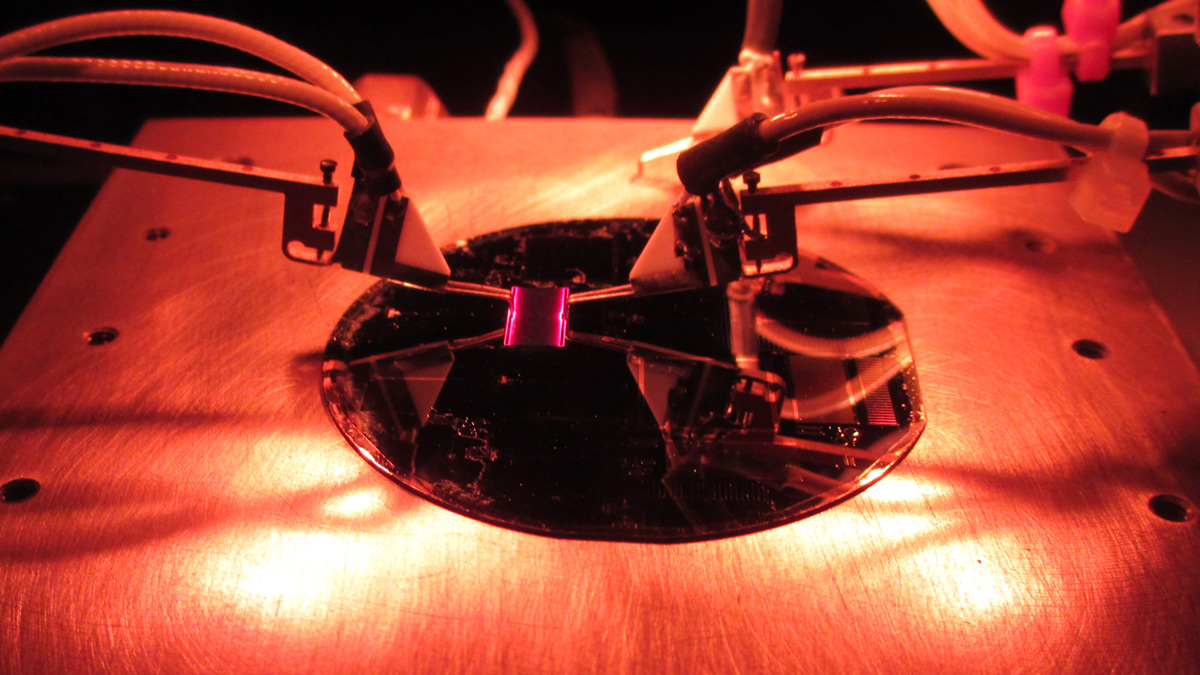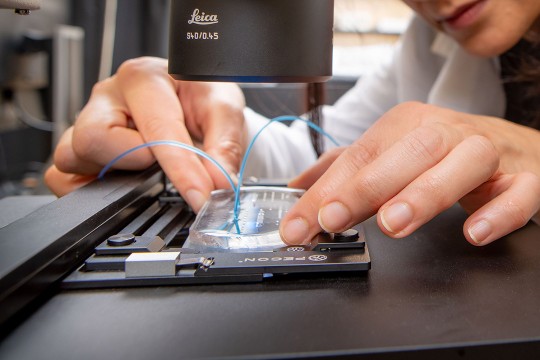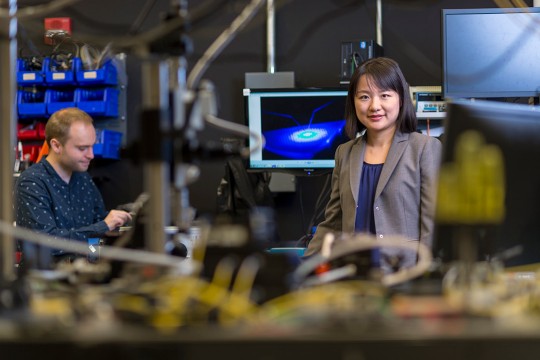Physics Doctor of Philosophy (Ph.D.) Degree

Physics
Doctor of Philosophy (Ph.D.) Degree
- RIT /
- Rochester Institute of Technology /
- Academics /
- Physics Ph.D.
RIT’s physics Ph.D. combines our interdisciplinary approach, renowned faculty, and cutting-edge facilities to empower you to excel in your research and shape the future of physics.
Overview for Physics Ph.D.
Physics plays a crucial role in advancing various scientific and technological fields. Through experimentation, observation, and mathematical analysis, physicists strive to unravel the mysteries of the universe and contribute to the advancement of scientific knowledge.
The physics Ph.D. program fosters a creative and innovative approach to physics education and knowledge expertise. Graduates of the physics Ph.D. become leaders in their field, shaping and improving the world with the knowledge gained at RIT.
Ph.D. Program in Physics at RIT
RIT's physics Ph.D. program offers various research areas, allowing students to pursue their passion and delve into cutting-edge scientific investigations. As a physics doctoral student, you will have the opportunity to work alongside world-class faculty members at the forefront of their respective fields. Our distinguished professors are dedicated to mentorship, ensuring each student receives personalized guidance and support throughout their academic journey.
The physics Ph.D. program offers a comprehensive and rigorous curriculum designed to provide you with a deep understanding of fundamental physics principles, advanced research skills, and specialized knowledge in your chosen areas of focus. The program combines core courses, electives, research work, and professional development activities.
-
Join us for Fall 2026
Many programs accept applications on a rolling, space-available basis.
Research
A significant component of the physics doctorate involves conducting original research under the guidance of faculty advisors. You will work on research projects aligned with your interests, contributing to the advancement of scientific knowledge. This research culminates in completing a doctoral dissertation, which involves original findings and a written thesis.
You will have abundant access to innovative and exciting research. We know that involvement in original research helps prepare our students for their future careers. The physics Ph.D. program offers a diverse range of research areas, allowing students to explore and specialize in various fields of physics.
Physics Research Areas:
- Atomic/molecular/optical (AMO) physics: Exploring the behavior of atoms, molecules, and optical phenomena.
- Faculty: Mishkat Bhattacharya, Edwin Hach III, Nicola Lanata, Stefan Preble
- Biological and soft matter physics: Investigate the behavior of biomolecules, cellular processes, and complex biological systems using physics-based approaches.
- Condensed matter physics: Investigating the properties and behavior of solid materials and complex systems at the atomic and subatomic levels.
- Multi-messenger astrophysics: Includes such areas as gravitational wave physics, special and general relativity, and cosmology.
- Nanoscale materials and device physics: Study the unique characteristics of nanomaterials and their applications in electronic, magnetic, and optical devices.
- Photonics and the next quantum revolution: Focus on harnessing the properties of light and exploring the potential of quantum technologies to develop revolutionary technologies.
- Faculty: Donald Figer, Edwin Hach III, Seth Hubbard, Stefan Preble
- Physics education research: Study how to enhance the teaching and learning of physics to enhance student engagement, conceptual understanding, and problem-solving skills in physics education, departmental and cultural change in physics undergraduate and graduate programs, ultimately shaping the future of science education.
- Faculty: Scott Franklin, Benjamin Zwickl, Diana Sachmpazidi
- Physics for sustainable/renewable energy: Addresses the challenges of sustainable energy production and storage. Investigate innovative materials, devices, and systems for renewable energy generation to develop efficient and environmentally friendly solutions to meet the growing global energy demand and reduce dependence on fossil fuels.
- Faculty: Pratik Dholabhai, Seth Hubbard, Santosh Kurinec, Nishant Malik
- Spectroscopy and Microscopy: Focus on developing and applying advanced spectroscopic and microscopic techniques to probe and manipulate matter at atomic and molecular scales. Use state-of-the-art instruments and methodologies to study materials' structural, electronic, and optical properties, enabling insights into fundamental physics, materials science, and nanotechnology.
- Faculty: Charles Bachmann, Stefan Preble, Jie Qiao
You will have the opportunity to collaborate with faculty members and engage in cutting-edge research projects aligned with your interests and career aspirations. The physics program encourages interdisciplinary research and the exploration of new frontiers in physics, fostering innovation and scientific discovery.
Related News
-
April 22, 2025

Ph.D. student channels her resilience into solutions
Katie Malarkey's research, funded by a $15 million National Science Foundation grant, provides a comprehensive quantification of plastics used annually in U.S. agriculture. Her work aims to address the end-of-life challenges for these materials.
-
August 20, 2024

New Ph.D. programs welcome students this fall
The university’s two newest Ph.D. programs in cognitive science and physics offer diverse research opportunities for students and help them gain the skills and abilities needed to analyze data and grasp complex concepts. The new programs bring RIT’s total doctoral programs to 15.
-
August 8, 2024

NSF awards RIT nearly $3 million to advance semiconductor technologies
The award is part of the NSF’s Research Traineeship Program (NRT), a national initiative to better prepare master’s and doctoral students for the interdisciplinary talents required in semiconductor chip development. The grant will provide 20 doctoral student fellowships to advance research in the much-needed field of semiconductor technologies.
Curriculum for 2025-2026 for Physics Ph.D.
Current Students: See Curriculum Requirements
Students are also interested in
Admissions and Financial Aid
This program is available on-campus only.
| Offered | Admit Term(s) | Application Deadline | STEM Designated |
|---|---|---|---|
| Full‑time | Fall | January 15 priority deadline, rolling thereafter | Yes |
Full-time study is 9+ semester credit hours. International students requiring a visa to study at the RIT Rochester campus must study full‑time.
Application Details
To be considered for admission to the Physics Ph.D. program, candidates must fulfill the following requirements:
- Learn tips to apply for a doctoral program and then complete a graduate application.
- Submit copies of official transcript(s) (in English) of all previously completed undergraduate and graduate course work, including any transfer credit earned.
- Hold a baccalaureate degree (or US equivalent) from an accredited university or college in physical sciences or engineering. A minimum cumulative GPA of 3.0 (or equivalent) is recommended.
- Satisfy prerequisite requirements and/or complete foundation courses prior to starting program coursework.
- Submit a current resume or curriculum vitae.
- Submit a statement of purpose for research which will allow the Admissions Committee to learn the most about you as a prospective researcher.
- Submit two letters of recommendation.
- Entrance exam requirements: GRE, both General and Physics, are optional
- Submit English language test scores (TOEFL, IELTS, PTE Academic, etc.), if required. Details are below.
English Language Test Scores
International applicants whose native language is not English must submit one of the following official English language test scores. Some international applicants may be considered for an English test requirement waiver.
Duolingo (DET): 135
IELTS: 7.0
LanguageCert Academic: 78
PTE Academic: 66
TOEFL: 94/5
International students below the minimum requirement may be considered for conditional admission. Deaf and hard-of-hearing test takers with significant hearing loss do not need to take the listening and speaking sections for the TOEFL and IELTS. Each program requires balanced sub-scores when determining an applicant’s need for additional English language courses.
How to Apply Start or Manage Your Application
Cost and Financial Aid
An RIT graduate degree is an investment with lifelong returns. Ph.D. students typically receive full tuition and an RIT Graduate Assistantship that will consist of a research assistantship (stipend) or a teaching assistantship (salary).
The School is committed to a diverse applications pool and alleviating any financial burden of application. For information, please contact the Program Director.
Additional Information
Foundation Courses
Physics forms the backbone of many scientific and engineering disciplines, thus candidates from diverse backgrounds are encouraged to apply. However, applicants to the doctoral program are typically expected to have some undergraduate preparation in physics, including courses in electromagnetism, classical and quantum mechanics, statistical physics, and mathematical methods of physics. If applicants have not taken the expected background coursework, the program director may require the student to successfully complete foundational courses prior to matriculating into the Ph.D. program. A written agreement between the candidate and the program director will identify the required foundation courses, which must be completed with an overall B average before a student can matriculate into the graduate program. Note that this can lead to a delay in degree completion by as much as a year.
Accreditation
Contact
- Mandie Klingelhoffer
- Senior Assistant Director
- Graduate Admissions
- Enrollment Management
- 585‑475‑5526
- mskecr@rit.edu
- Moumita Das
- Professor, Physics
- School of Physics and Astronomy
- College of Science
- modsps@rit.edu
School of Physics and Astronomy


















